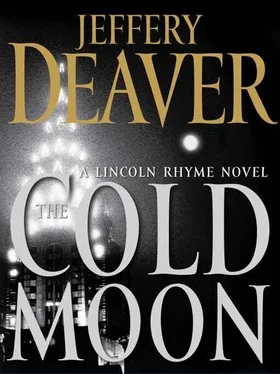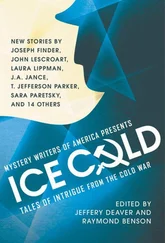But when Sachs mentioned that somebody had broken into her car at the scene-where Baker had been-she remembered the lieutenant's possibly deceptive behavior. Sachs had called Nancy Simpson, who'd been at the scene, and asked her what time Baker had left.
"Right after you, Detective," the officer had said.
But Baker had said he'd stayed for almost an hour.
Simpson added that she believed Baker had gone to Brooklyn. Sachs had asked him about being in the borough now to see if Dance could pick up signs of possible deception.
"You broke into my car and went through my purse," she said. Her voice was harsh. "And you asked a neighbor about me-pretending to be a cop I'd worked with."
Would he deny it? This could blow up in their faces if Dance and Sachs were wrong.
But Baker looked down at the floor. "Look, this's all a misunderstanding."
"You talked to my neighbor?" she asked angrily.
"Yes."
She eased closer to him. They were about the same height but Sachs, in her anger, seemed to tower over him. "You drive a black Mercedes?"
He frowned. "On a cop's salary?" This answer seemed genuine.
Rhyme glanced at Cooper, who went to the DMV database. The tech shook his head. "Not his wheels."
Well, they got one wrong. But Baker'd clearly been nabbed at something.
"So, what's the story?" Rhyme asked.
Baker looked at Sachs. "Amelia, I really wanted you on the case. You and Lincoln together, you're an A team. And frankly, you guys get good press. And I wanted to be associated with you. But after I convinced the top floor to bring you on board, I heard there was a problem."
"What?" she asked firmly.
"In my briefcase, there's a sheet of paper." He nodded to Pulaski, who was standing beside the battered attaché case. "It's folded up. In the top right-hand side."
The rookie opened the case and found it.
"It's an email," Baker continued.
Sachs took it from Pulaski. She read it once, frowning. She was motionless for a moment. Then she stepped closer to Rhyme and set it on the wide arm of his wheelchair. He read the brief, confidential note. It was from a senior inspector at Police Plaza. It said that a few years earlier Sachs had been involved with an NYPD detective, Nicholas Carelli, who'd been convicted of various charges, including hijackings, bribes and assault.
Sachs had not been implicated in the incidents but Carelli had been released not long ago and the brass were concerned that she might have had some contact with him. They didn't think she'd done anything illegal but if she was seen with him now, it could be, the email said, "embarrassing."
Sachs cleared her throat and said nothing. Rhyme had known all about Nick and Sachs-how they'd talked about getting married, how close they'd been, how shattered she'd been by his secret life as a criminal.
Baker shook his head. "I'm sorry. I didn't know how else to handle it. I was told to give them a complete report. Details of where I'd observed you, things I learned about you. On the job and off. Any connection with this Carelli or any of his friends."
"That's why you were pumping me for information about her," Rhyme said angrily. "This's bullshit."
"All respect, Lincoln, I'm putting myself on the line here. They wanted to pull her anyway. They didn't want her on a high-profile case, not with that history. But I said no."
"I haven't seen Nick in years. I didn't even know he was out."
"And that's what I'm going to tell them." He nodded toward his briefcase again. "My notes're in there." Pulaski found some more sheets of paper. He gave them to Sachs and she read through then laid them out for Rhyme to read. They were jottings about the times he'd observed her and questions he'd asked, what he'd seen in her calendar and address book, what people had said about her.
"You broke and entered," Sellitto said.
"Conceded. Over the line. Sorry."
"Why the fuck didn't you come to me?" Rhyme snapped.
"Or any of us," Sellitto said.
"This came from high up. I was told to keep it quiet." Baker turned to Sachs. "You're upset. I'm sorry about that. But I really wanted you on the case. It was the only way I could think of. I've already told them my conclusions. The whole thing's gone away. Look, please, can we put this behind us and get on with our job?"
Rhyme glanced at Sachs, and what hurt him the most was to see her reaction to the incident: She wasn't angry any longer. She seemed embarrassed to have been the cause of this controversy and trouble to her fellow officers, distracting them from their mission. It was so unusual-and therefore so hard-to see Amelia Sachs pained and vulnerable.
She handed the email back to Baker. Without a word to anyone she grabbed her jacket and walked calmly out the doorway, pulling her car keys from her pocket.

Vincent Reynolds was studying the woman in the restaurant, a slim brunette, about thirty, in sweats. Her short hair was pulled back and stuck in place with bobby pins. They'd followed her from her old apartment in Greenwich Village, first to a local tavern and now here, a coffeehouse a few blocks away. She and her friend, a blonde in her twenties, were having a great time, laughing and talking nonstop.
Lucy Richter was enjoying her last brief moments on earth.
Duncan was listening to classical music on the Buick's sound system. He was his typically thoughtful, calm self. Sometimes you just couldn't tell what was going on in his mind.
Vincent, on the other hand, felt the hunger unraveling within him. He ate a candy bar, then another.
Fuck the great scheme of things. I need a girl…
Duncan took out his gold pocket watch and looked at it, gently wound the stem.
Vincent had seen the watch a few times but he was always impressed with the piece. Duncan had explained that it was made by Breguet, a French watchmaker who lived a long time ago ("in my opinion the finest who ever lived").
The watch was simple. It had a white face, Roman numerals and some small dials that showed the phases of the moon and was a perpetual calendar. It also had a "parachute," an antishock system in it, Duncan explained. Breguet's own invention.
Vincent now asked him, "How old is it, your watch?"
"It was made in the year twelve."
"Twelve? Like in Roman times?"
Duncan smiled. "No, sorry. That's the date on the original bill of sale, so that's what I think of as the year of manufacture. I mean the year twelve in the French revolutionary calendar. After the monarchy fell, the republic declared a new calendar, starting in seventeen ninety-two. It was a curious concept. The weeks had ten days, and each month had thirty. Every six years was a leap year devoted exclusively to sports. For some reason, the government thought the calendar would be more egalitarian than the traditional one. But it was too unwieldy. It only lasted fourteen years. Like a lot of revolutionary ideas-they seem good on paper but they're not very practical."
Duncan studied the golden disk with affection. "I like watches from that era. Back then a watch was power. Not many people could afford one. The owner of a watch was a man who controlled time. You came to him and you waited until the time he'd set for the meeting. Chains and fobs were invented so that even when a man carried a watch in his pocket, you still could see he owned one. Watchmakers were gods in those days." Duncan paused. "I was speaking figuratively, but in a way it's true."
Vincent cocked an eyebrow.
"There was a philosophical movement in the eighteenth century that used the watch as a metaphor. It held that God created the mechanism of the universe, then wound it up and started it running. Sort of a perpetual clock. God was called the 'Great Watchmaker.' Whether you believe it or not, the philosophy had a lot of followers. It gave watchmakers an almost priestlike status."
Читать дальше













